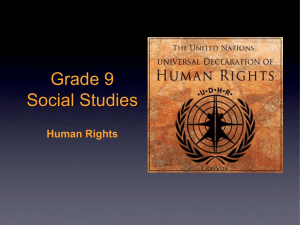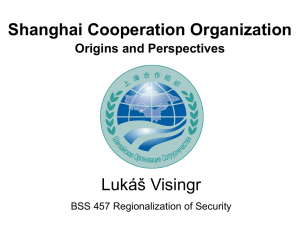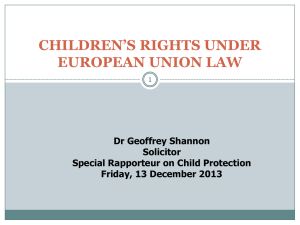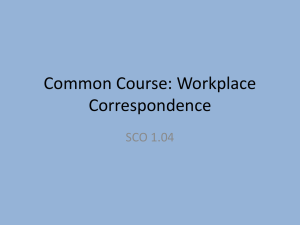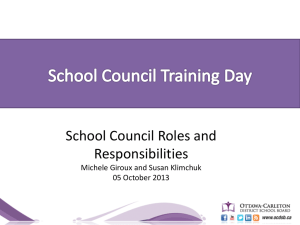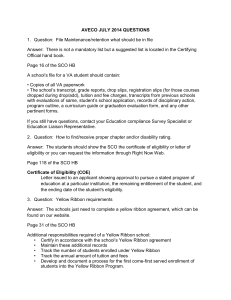Cooley Slides - Carnegie Endowment for International Peace
advertisement
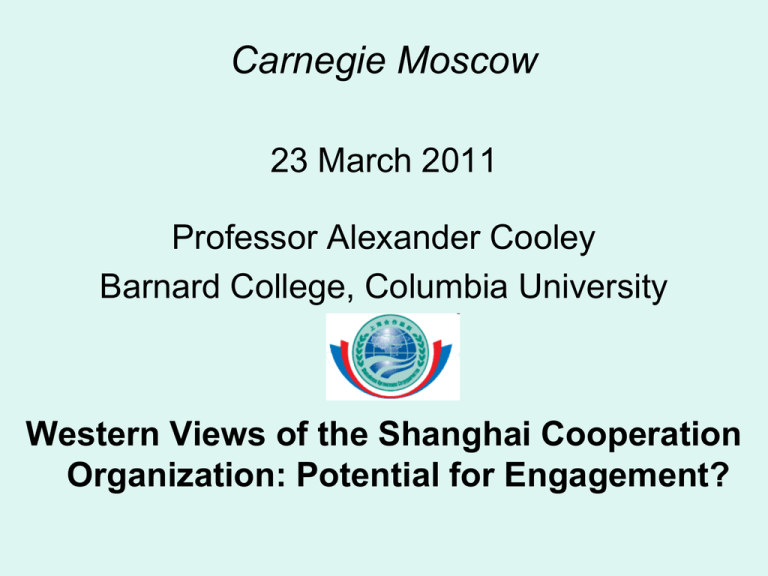
Carnegie Moscow 23 March 2011 Professor Alexander Cooley Barnard College, Columbia University Western Views of the Shanghai Cooperation Organization: Potential for Engagement? What is the SCO? As the most important code of conduct of the SCO, the "Shanghai Spirit" has enriched the theories and practices in contemporary international relations and has manifested the popular demand of the international community for the democratization of international relations. It is of immense significance in the search of the international community for the establishment of a new type of international relations. China National News Service, August 2007 Outline of the Presentation I. Different Western Views of the SCO II. Evaluation of Empirical Record and Trends III. Emerging EU and US Attitudes towards the SCO IV. Conclusion: Theoretical and Practical Recommendations Differing Western Views of the SCO View #1: SCO as Anti-Western Bloc • 2005 Astana Declaration on US military bases (Blank) • Fear of Russia-China Strategic Partnership; SoftBalancing (Walt; Pape) • Concern Over “Energy Club” and Iranian Participation (Cohen; Jamestown Foundation) Split in Russian-China Security Agenda? The Impact of the Georgia War • Russian Recognition of Independent Abkhazia and South Ossetia • China and Central Asia’s refusal to follow at 2008 SCO Summit in Dushanbe • Moving from the SCO to the CSTO? Northern Distribution Network Source: International Institute for Strategic Studies Differing Western Views of the SCO View #2: SCO as an “Authoritarian Club” (Ambrosio 2008; Amnesty International) • “Shanghai Spirit” vs. Western Liberal Values • Sovereign “Non-Interference” Condones Political Repression • Privileges State power over Civil Society SCO and Political Values • Does the SCO Restrict Democratic Opposition under the 3 Evils Principle (separatism, terrorism, extremism)? • Does the SCO Target Western NGOs working on Democracy Issues (post Colored Revolutions)? • SCO Election Monitors vs. OSCE/ODIHR Monitors • Human rights and Rendition Policies Differing Western Views of the SCO View #3: SCO as a Regional Public Goods Provider (Antonenko 2007; Marcel de Haas) • SCO is Fostering Needed Regional Integration and Cooperation • From Border Resolution, to Economic Cooperation, Trade, Infrastructure and Communication; Partner for Afghanistan • Recommendation: EU-US-NATO should Engage with SCO SCO as a Public Goods Provider: The Economic Agenda Stalled? • Little Progress Made on SCO Free Trade Zone • Infrastructure and Development Taking Place through Bilateral Agreements With China, not through SCO Business Council or Interbank Mechanism • Lack of Coordination on Response to Financial Crisis Financial Crisis Emphasized Chinese Strength, Russian Weakness SCO as a Public Goods Provider: The Economic Agenda Financial Crisis Emphasized Chinese Strength, Russian Weakness • Debate over the Stabilization Fund - Russia prefers to Make Bilateral loans to CIS countries (Belarus, Moldova, Kyrgyzstan) - Still has problems securing political demands - China funds SCO Stabilization Fund Unilaterally ($10b) SCO as a Public Goods Provider: The Economic Agenda Financial Crisis Emphasized Institutional Weakness of Central Asian States (Kyrgyzstan, Tajikistan) • Borders in Central Asia remain “Commercialized” • Informal Barriers Remain High • Institutionalized Corruption High in State Agencies (customs, border guard and security services) • Agreements Signed vs. Capacity to Implement • Similar Problem with Anti-Narcotics Initiatives (Tajik border guard) Emerging EU Views of the SCO • Competence: Mixed. Support public goods dimension. Disappointed in lack of progress on trade, infrastructure and economic development. • Values: Negative. Issues of Minority rights vs. Separatism; role of Ahmadinejad in SCO • Strategy: Mixed. Consistent with EU Central Asia strategy and the promotion of regional integration. But EU-China bilateral relations also possible as forum. Emerging NATO Views of the SCO • Competence: Indifferent. Regional public goods agenda is not a NATO concern; too early to evaluate anti-narcotics initiative. • Values: Indifferent. NATO has downgraded the values dimension in dealing with Central Asia • Strategy: Potentially positive. Enhancing sovereignty of Central Asia states; preferable to CSTO; new strategic context of NDN Conclusions: Terms of Engagement • Differential Prospects for Engagement: Western international organizations will respond to the SCO according to their different priorities: competence, values and regional strategy. • EU vs NATO: At the moment, EU seems to be trending against engagement; possibility with NATO-US might be there for the future Conclusions: Sovereignty and Regional Integration • SCO and Sovereignty: SCO places priority on respecting the sovereignty and domestic non-interference in member states • Yet, many SCO initiatives are slow because of institutional weaknesses in Central Asian states (corruption, patronage, informal networks, commercialization of borders) • Successful regional integration requires high technical competence and precision for implementation • Some sovereign delegation seems inevitable • Otherwise, increasing bilateral contacts and functional substitution will substitute for SCO multilateral structures Conclusions: Potential Tensions with Other International Organizations Will the SCO Coordinate with Other Organizations? • New SCO Stabilization fund: $10 billion far Surpasses Western Economic Assistance in Central Asia • Will SCO Coordinate with Other Providers of Project and Infrastructure Financing (World Bank, ADB, EU)? • The “Angola Scenario”: China is Viewed as Displacing International Organizations in Central Asia Conclusions: SCO Needs a “Public Success” Engagement would be Helped by an SCO “Public Goods” Success • Water Management and Coordination • Investment or Projects in Afghanistan • Real progress on Trade and Economic Development
